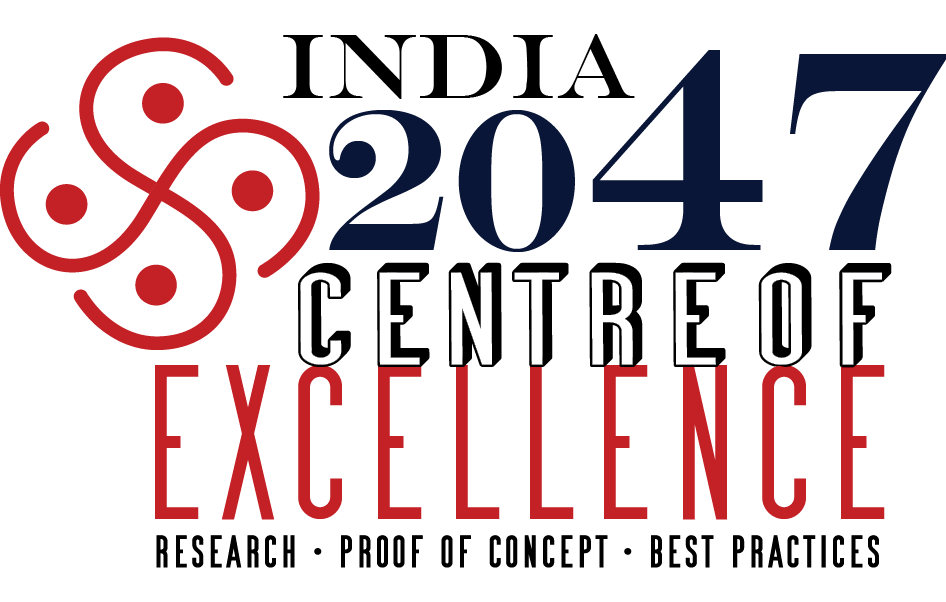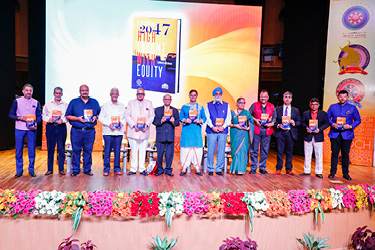
Research
- Human Rights in Business Index
- Corporate Digital Responsibility Index
- Digital Transformation Index
- Governance Excellence Index
- Social Excellence Index
- Environmental Excellence Index
- Corporate Excellence Index
- Harmonising ESG, CSR, CDR, Human Rights and SDGs
- Creating Greenfield Indices for Global Use
- Correcting Global Indices to be more representative of Global South and India
- Employment Generation
Proof of Concept
- Monetisation of Digital Assets
- Developing Use Cases
- Monetisation of Videos using Videotech and AI
- More to be added...
- Data Science & Analytics
- Use Cases of Indian Languages
- Identifying and Creating Use Cases for New and Emerging Strategic Technologies
- Benchmarking
- Comprehensive Economic Impact
- CEI of Cloud
- CEI of Indian Languages Content
- CEI of Endpoint Deployment
Best Practices
- India Involved Index
- Corporate Digital Responsibility Index
- Responsible Gaming Index
- Responsible OTT Index
- Responsible Digital Lending Index
- Responsible Social Media Intermediaries Index
- Case Studies
- Knowledge Repository
- Nationalism dominates global trade and politics post-WTO, shifting focus to non-tariff barriers. However, this narrative overlooks the realities of the Global South, diminishing its moral and spiritual aspects.
- Businesses face uniform expectations for ESG, CSR and CDR compliance across trade, alongside perceived moral grandstanding in Human Rights and Democracy indices by the Global North.
- The Global South’s issues, context and necessary solutions are often disregarded, mainly due to a lack of institutional capacity in understanding the complexities of compliance and associated indices.
- New and Emerging Strategic Technologies (NEST) will lead to new and emerging strategic challenges in the global context.
- There is a pronounced need to research and propose frameworks either within such Global North standards or as a counter standard that takes cognisance of what the South needs.
- India 2047—Centre of Excellence is set up by SKOCH Development Foundation to fill this critical gap.
- It will Research, set up Proof-of-Concept and document Best Practices to create Global Benckmarks and Indices that counterbalance, redefine and build capacity for India’s leadership from the Global South viewpoint.
- The Centre of Excellence will develop frameworks, measurement criteria and local and global indices that can be noted, learned from and used for subjects including sovereign ratings.
Corporate Digital Responsibility - A Backgrounder
Corporate Digital Responsibility (CDR) stands at the forefront of modern business ethos, encompassing a broad spectrum of considerations ranging from data protection and cybersecurity to ethical technology deployment and societal impact. As the digital landscape continues to evolve, so too do the demands placed upon corporations to navigate these complex terrains responsibly.
RESPONSIBLE BEHAVIOUR
The evolution of responsible behaviour extends beyond digital, encompassing industries like gaming, OTT, social media intermediaries, digital lending, gambling, alcohol, tobacco and pharmaceuticals. Regulatory interventions, corporate responsibility initiatives and public health campaigns underscore the collective effort to mitigate societal harms.
While OTT platforms play a crucial role in upholding ethical standards, safeguarding user data and promoting digital inclusivity; social media intermediaries are tasked with moderating user-generated content to ensure that it complies with community standards and legal requirements.
As financial institutions and fintech companies leverage digital platforms to provide access to credit and financial products, it’s imperative that they uphold ethical standards, protect consumer rights and promote financial well-being.
New, Emerging and Strategic Technologies
The significance of new, emerging and strategic technologies (NEST) in advancing a nation’s development, economic prosperity, national security, and diplomatic relations has never been more pronounced. This entails continuous monitoring, analysing the legal ramifications of technology-driven resources and evaluating opportunities for collaboration. Three decades ago, this might have primarily referred to the Internet, but today, it encompasses AI, biotechnology, nanotechnology, 3D printing, and beyond. The intertwining of emerging technologies and CDR underscores the imperative for companies to embrace and utilise these technologies conscientiously and ethically, considering their societal, environmental and ethical implications.
The establishment of the NEST division in the Ministry of External Affairs is a significant step that underscores the importance of emerging technologies to India’s expanding digital landscape and domestic industries.
Global Framework
The foundation of CDR was laid in the early 2000s, primarily focusing on data protection and security. Initiatives like the US Children’s Online Privacy Protection Act (COPPA) and Europe’s General Data Protection Regulation (GDPR) set the stage for stringent regulations governing the handling of user data. In the United States, sector-specific laws such as the Health Insurance Portability and Accountability Act (HIPAA) and the Sarbanes-Oxley Act (SOX) reinforce cybersecurity measures, while the California Consumer Privacy Act (CCPA) empowers consumers with greater control over their personal information.
Meanwhile, the EU’s GDPR revolutionised data protection standards, emphasising transparency, accountability, and user consent. The Network and Information Systems (NIS) Directive and upcoming Digital Services Act (DSA) and Digital Markets Act (DMA) further bolster Europe’s commitment to safeguarding digital rights and fostering fair competition.
Beyond the US and EU, countries worldwide are enacting their own data protection laws, such as Singapore’s Personal Data Protection Act (PDPA) and Brazil’s Lei Geral de Proteção de Dados (LGPD), underscoring the global relevance of CDR.
Technology and Ethics
The proliferation of cutting-edge technologies like AI has expanded the scope of CDR to include ethical considerations. Governance structures, bias mitigation protocols and impact assessments are crucial in ensuring the responsible development and deployment of AI systems.
Data ethics and privacy remain paramount, with principles like Privacy by Design and robust consent management practices guiding companies towards responsible data handling. Cybersecurity measures, including risk assessments and proactive incident response plans are indispensable in safeguarding digital assets and customer trust.
Sustainability and Digital Inclusion
In recent years, CDR has extended its purview to encompass environmental sustainability and digital inclusion. Initiatives like the Energy Star programme and the EU’s Eco-Management and Audit Scheme (EMAS) promote eco-friendly practices in digital operations. Companies also strive to make technology accessible to all, aligning with UN SDGs.
Self-Regulation Frameworks
Many companies are proactively upholding CDR principles through internal digital ethics boards and voluntary commitments. Collaborative initiatives like the GNI exemplify the industry’s collective effort to uphold freedom of expression and privacy rights. Transparency and accountability are central to CDR, with companies expected to publish regular reports on their digital responsibility practices.
Prevention of Mental Health Issues
As digital consumption continues to rise, concerns regarding its impact on mental health have come to the forefront. Human-centric design principles, robust content moderation, and user controls are pivotal in mitigating potential harms associated with addictive digital behaviours. Embracing the principles of CDR is not just a moral imperative but a strategic imperative for corporate India.

